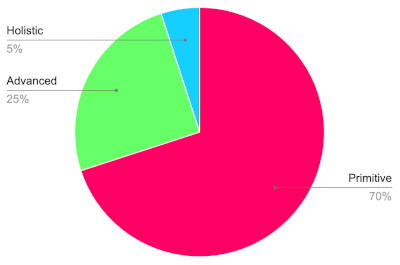Results = ƒ(Competence × Time)
Published on Oct 23, 2024, filed under management (feed). (Share this on Mastodon or Bluesky?)
When we hire, it is to achieve results. To achieve these results, we need expertise or competence, and we usually have a plan, including a time frame, for when we need the results:
Results = ƒ(Competence × Time)
That’s one simple model—it assumes availability of budget and non-people resources—that we can apply to work and hiring in our organizations.
What’s interesting about this model is that it can tell us something about how we work, and how we could work.
Three Models
The Primitive Model
In this model, competence depends on what we have, i.e., the currently available competence of the currently available headcount; and time depends on what we’ve planned.
Scaling in the primitive model is done by adding extra competence by adding extra people or hiring needed expertise.
The Advanced Model
In the advanced model, competence is recognized as something that can be increased not only by transferring or hiring people, but by training them.
Scaling still involves adding or hiring people, but also includes coaching and mentoring them.
The Holistic Model
Since transferring, hiring, and training people are well-known options, the holistic model builds on the advanced model by making more conscious use of time.
This means that scaling also works by granting results time—time for training, time for development, time for completion, time to seize opportunity, time wherever it’s useful.
Models in Practice
Instinctively and unscientifically, here is my perception of the distribution and popularity of these models:
That is, based on my observations, the primitive model is the most commonly used one, trailed by the advanced and holistic ones. This carries no judgment—there can be good reasons for this, including that we’re talking about a snapshot, i.e., something temporary.
How this shows is that the typical reflex is to ask for more people—transfer or hire them. It’s rare to ask for training, or to ask for time.
The Value of Time
While we may likewise speak of a reflex when precisely, time is not admitted for our business goals, that reflex seems short-sighted.
What these models sketch is that time is a tool; we may opt not to expend it, but we need to be aware that we can use it.
Also, as the holistic model emphasizes, time allows us to up-level our organizations without hiring. While up-leveling can be done by hiring (and firing), that’s neither people-minded nor holistic. It behooves us to invest in our people, and part of that investment is to give them time (as well as resources and budget) to grow.
❧ The true point, however, seems to be a general issue around how we work with time. In business, time seems to be missing everywhere. In what I’ve seen over the last years, time is being granted for very little. Everything needs to happen now, at least asap. There’s a latent suspicion that granting time invites and translates to laziness and inefficiency. In such a climate, people ask less frequently about getting more time, and try to make up for the lack of it—as with transferring and hiring people, instead of training them. No wonder, then, that the primitive model becomes prevalent.
When we include time, and review the models, the primitive one may eventually look like an insult—an insult to the people we’re responsible for and whom we fail to develop, and an insult to our intelligence which we don’t use to cultivate a sense for what we need time for.
As “always,” however, I’d like to stay humble. This is not an academic study, not an academic site, and while I do think about what I write, I probably miss more things than I imagine. I’d be curious to learn about your thoughts and observations.
About Me
I’m Jens (long: Jens Oliver Meiert), and I’m a web developer, manager, and author. I’ve been working as a technical lead and engineering manager for companies you’ve never heard of and companies you use every day, I’m an occasional contributor to web standards (like HTML, CSS, WCAG), and I write and review books for O’Reilly and Frontend Dogma.
I love trying things, not only in web development and engineering management, but also in other areas like philosophy. Here on meiert.com I share some of my experiences and views. (I value you being critical, interpreting charitably, and giving feedback.)

